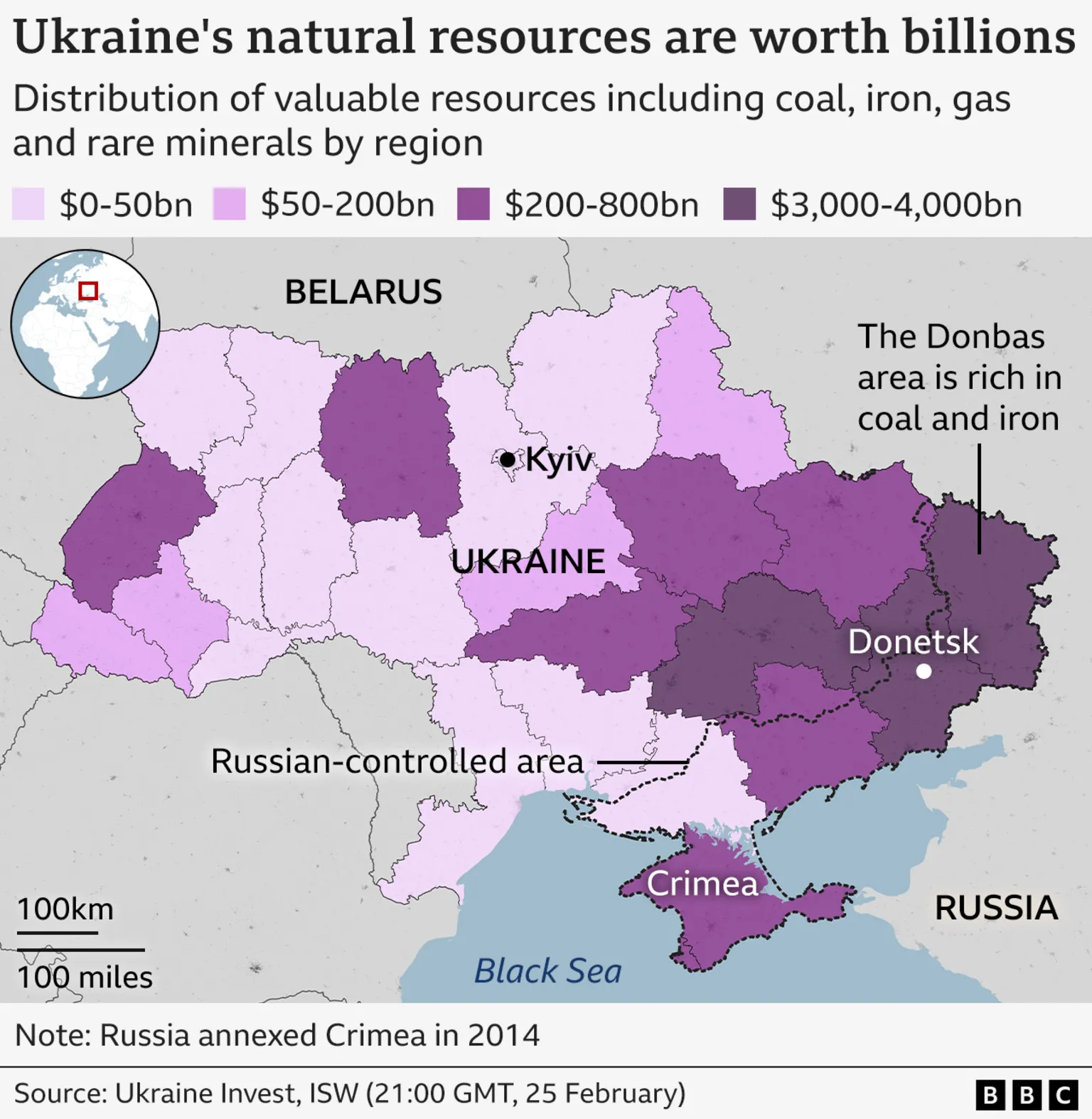Trump's mineral deal with Ukraine
- Sebastian Palacios.

- May 1, 2025
- 3 min read
Ukraine has deposits containing 22 of the so-called 34 critical minerals that are essential for energy security. Certainly, it ranks globally as the third-largest producer of the mineral rutile (16% of world’s total output); it is the sixth-largest producer of iron ore (3% of total output) and titanium (6%) which is used for making aircraft wings and other aerospace manufacturing, as well as the seventh-largest producer of manganese ore (3 %). Ukraine also has the 11th largest uranium reserves in the world and the largest in Europe, which are essential for nuclear power and weapons.
It also has important deposits of neodymium and dysprosium, which are needed for manufacturing everything from smartphones to wind turbines and electric motors. Electric vehicles, wind turbines, solar panels and energy storage systems all require lithium, cobalt and rare Earth elements which Ukraine has in abundance. Therefore, Ukraine is among one of the world’s most resource-rich countries in the world.
Due to the global energy transition, getting access to these minerals can make a country much richer. For example, the price of lithium has surged from US$1,500 per ton in the 1990s to around $20,000 recently; a Tesla Model S battery requires 63kg of high-purity lithium; and the demand for these kinds of minerals is expected to increase around 40 times by 2040. Many of the rare mineral deposits are located in Russian occupied territories or close to the front-line, so a deal regarding these economic assets is crucial to advance on peace talks between Ukraine and Russia.
Since Trump wants to get “US taxpayers money back” (120 billion dollars of aid to Ukraine since February 2022), and being able to justify to his political supporters sending more military aid to Kyiv, the Trump administration has been trying to secure US access to Ukraine’s natural resources. While the US has many of the same rare minerals as Ukraine, it has historically outsourced mining and refining due to environmental regulations and high labour costs. This has led to a reliance on rare mineral imports from China, which is the biggest global producer. By securing a deal about Ukraine’s minerals in exchange for military protection the US is going to be less dependent on China, a major geopolitical rival, for such critical assets.
This week, both the Ukrainian and US governments announced the much expected deal. The details of it have not been fully disclosed yet, but it will involve creating a mutual investment fund jointly managed by Kyiv and Washington in which Ukraine will contribute 50% of future proceeds from state-owned mineral resources, oil and gas and other extractable materials to a reconstruction for Ukraine’s post-war rebuilding. In an unusual warm statement towards Ukraine, the US said the agreement "signals to Russia" that the Trump administration is "committed to a peace process centred on a free, sovereign, and prosperous Ukraine". The resources will remain the property of Ukraine, and Kyiv will choose where to do the extracting. As part of the deal, the US will contribute new military assistance to Kyiv.
The fund's income and contributions will not be taxed by either country and no state or person who financed or supplied the Russian war effort will be allowed to participate in the business of the reconstruction of Ukraine. The agreement also includes provisions for new oil and gas projects, and related infrastructure. The deal acknowledges Ukraine's intention to join the EU and the need for this preferential agreement with the US not to conflict with that.
There are no concrete security guarantees from Trump, but due to the new economic interests of the US, it is unlikely that Russia will be allowed to advance more into Ukraine.
During the first decade, the profits from the investment fund will be "fully reinvested in Ukraine's economy" and after that the profits will be distributed equally between the partners.
Finally, Russia welcomed the deal and Putin repeated that he was ready to "offer" resources to the US, including mining permits in Russia's occupied territories in eastern Ukraine.













Comments